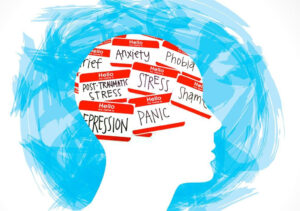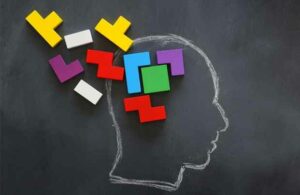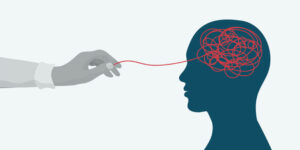Misdiagnosis is a common problem, and it can be especially difficult to get the correct diagnosis for OCD. This is because OCD symptoms can be mistaken for other mental health conditions. If you are struggling with OCD, it is important to get the proper diagnosis so that you can receive the appropriate treatment. In this blog post, we will discuss how to get the proper diagnosis for OCD and what to do if you have been misdiagnosed in the past.
Contents
What Is OCD?

OCD, a popular acronym for Obsessive-Compulsive Disorder, is a mental disorder that is characterized by obsessions and compulsions. Obsessions are intrusive thoughts, images, or urges that cause anxiety or distress. Compulsions are repetitive behaviors or mental acts that a person feels compelled to do in order to reduce their anxiety or distress.
OCD can be a debilitating disorder that interferes with a person’s ability to function in their daily life. Symptoms of OCD can range from mild to severe, and they can vary from person to person. The obsessions and compulsions can range from simple and repetitive behaviors, such as hand-washing or checking the locks on the doors, to more complex and time-consuming activities, such as organizing and cleaning. Some other common themes and symptoms of OCD include:
- Fear of contamination or dirt
- Excessive worry about harm coming to oneself or others
- Intrusive thoughts about sex or violence
- Need for symmetry or orderliness
- Preoccupation with religion or morality
While these are just a few examples, it is important to remember that OCD can manifest in many different ways. It is also important to note that not everyone who experiences these symptoms has OCD. In order to be diagnosed with OCD, a person must experience both obsessions and compulsions, and the symptoms must cause significant distress or impairment in their daily life.
What Are The Reasons OCD Gets Misdiagnosed?
OCD is a highly complicated and nuanced disorder, and it is often misunderstood. This misunderstanding can lead to misdiagnosis. Some of the reasons why OCD might be misdiagnosed include the following reasons.
Confused with other disorders
The symptoms of OCD are very complex and often overlap with other disorders. This can make it difficult for mental health professionals to correctly diagnose OCD. In addition, many people with OCD also have another mental disorder, which can further complicate the diagnosis. This may happen due to the fact that the symptoms of OCD can mimic other disorders or because having one mental disorder can increase the risk of developing another. Some of the most commonly confused and overlapping disorders that have a threat of being misdiagnosed as OCD include:

- Depressive disorders
- Anxiety disorders
- Eating disorders
- Attention-Deficit/Hyperactivity Disorder (ADHD)
- Post Traumatic Stress Disorder (PTSD)
- Asperger’s Syndrome/Autism Spectrum Disorder (ASD)
- Body Dysmorphic Disorder (BDD)
- Hoarding Disorder
- Schizophrenia
- Borderline Personality Disorder (BPD)
- Narcissistic Personality Disorder (NPD)
The DSM-5, popular by its full name Diagnostic and Statistical Manual of Mental Disorders, Fifth Edition, is the most recent and commonly used manual for diagnosing mental disorders. It classifies all disorders in order to provide a common language and standard criteria for diagnosis. However, the DSM-IV-TR, its predecessor, did not have specific criteria for OCD. This means that there was a greater chance for mental health professionals to misdiagnose OCD in the past.
The process of being diagnosed with OCD has changed since the release of the DSM-V. The new criteria are more specific and require that a person experience both obsessions and compulsions in order to be diagnosed with OCD. This change has helped to reduce the confusion between OCD and other disorders.
Unprofessional help
It is an unfortunate reality that even the professionals who are trained to help people with mental disorders can sometimes misdiagnose them. This is often because they are not familiar with all of the different types of mental disorders, or they might not be able to recognize the symptoms of OCD.
Moreover, some professionals can be quick to diagnose a person with OCD without fully evaluating all of the other potential causes for the symptoms. This is why it is so important to seek out professional help from someone who is knowledgeable and experienced in diagnosing and treating OCD.
Some other unprofessional and insensitive activities some mental health professionals may engage in include:
- Asking leading questions
- Minimizing your experiences
- Making assumptions about your symptoms
- Gaslighting or invalidating your experiences
- Failing to take into account your personal history
- Trying to fit you into a one-size-fits-all treatment model
These are just a few examples of how some mental health professionals can be unprofessional and insensitive when diagnosing OCD.
Additionally, some people also try and pose as professionals without adequate training, education, or license. This can further complicate getting an accurate diagnosis and also lead to people not getting the proper treatment they need.
Lack of awareness
 There is still a lot of misinformation and misunderstanding about OCD, which can lead to misdiagnosis. This is especially true if the person who is suffering from OCD does not have access to proper and accurate information about the disorder.
There is still a lot of misinformation and misunderstanding about OCD, which can lead to misdiagnosis. This is especially true if the person who is suffering from OCD does not have access to proper and accurate information about the disorder.
Many people with OCD also suffer from comorbid conditions, which means that they have more than one mental disorder. This can make the symptoms of OCD even harder to deal with and increases the risk of misdiagnosis.
Comorbid conditions are often caused by a lack of understanding and awareness about OCD. This is why it is so important to educate yourself about OCD and its symptoms. Only then can you be sure that you are getting the proper diagnosis and treatment for your condition.
Some common myths, misconceptions, and misunderstandings about OCD that can lead to misdiagnosis include:
- OCD is just about being clean and organized
- People with OCD are just lazy
- OCD is caused by bad parenting
- OCD is caused by trauma or a stressful event
- They just want attention and sympathy
- OCD is just being shy or introverted
- Having OCD means one is “crazy” or “psychopath”
These are just a few of the many myths and misconceptions about OCD that can lead to misdiagnosis. It is important to be aware of the weight words carry and the implications they might have.
Improper report of symptoms
Lastly, sometimes people with OCD might not accurately or properly report their symptoms to a mental health professional. This can be for a number of reasons, including feeling embarrassed, ashamed, or guilty about their obsessions and compulsions.
Additionally, some people with OCD might not even realize that their thoughts and behaviors are abnormal or excessive. This lack of insight can make it difficult to accurately report symptoms and can lead to misdiagnosis. They might also feel like they are not worthy of help or that their OCD is not severe enough to warrant treatment. Some things people might say or believe in this regard can include statements such as:
- “I can’t have OCD because my compulsions aren’t that bad.”
- “I don’t need treatment because I can control my OCD on my own.”
- “I’m not sure if I really have OCD or if I’m just overthinking things.”
- “If I say ______ to my therapist the wrong way, they might think I’m crazy.”
All of these statements reflect a lack of understanding about OCD and its symptoms. These are just a few of the reasons why people with OCD might not accurately report their symptoms. It is important to be honest and open with your mental health professional in order to get an accurate diagnosis and proper treatment.
Misdiagnosis can have serious consequences. If you are struggling with OCD, it is important to get the proper diagnosis so that you can receive the appropriate treatment. If you have been misdiagnosed in the past, there are steps that you can take to get the correct diagnosis and treatment.
What Are The Consequences Of Misdiagnosis?

Now that we know some of the reasons OCD gets misdiagnosed, we will now look into the downsides of misdiagnosis. Misdiagnosis can have a number of negative consequences, both for the person suffering from OCD and for those around them.
Misdiagnosis can lead to:
- The wrong treatment: If someone is misdiagnosed with OCD, they might end up receiving the wrong treatment. This can cause them to either not receive the help they need or to receive treatments that are actually harmful.
- Wasted time and money: Misdiagnosis can also lead to wasted time and money. If someone receives the wrong diagnosis, they might end up spending a lot of time and money on treatments that don’t work.
- Missed opportunities: Misdiagnosis can also cause missed opportunities. If someone is misdiagnosed with OCD, they might not be able to take advantage of helpful resources or treatment options.
- Increased suffering: Lastly, misdiagnosis can lead to increased suffering. If someone is not properly diagnosed with OCD, they might have to deal with their symptoms for a longer period of time. This can cause a lot of unnecessary pain and suffering.
These are just a few of the many consequences of misdiagnosis. As you can see, it is very important to get the proper diagnosis for OCD.
How To Prevent OCD From Being Misdiagnosed?
Now that we are aware of the dangers of misdiagnosis and lack of information, let’s now understand how we can prevent OCD from being misdiagnosed.

- The first and most important thing you can do is to be your own advocate. If you feel that you are struggling with OCD, it is important to seek professional help. Be sure to do your research and find a qualified mental health professional who has experience treating OCD.
- It is also important to be honest and upfront with your mental health professional about your symptoms and experiences. It can be difficult to discuss sensitive topics, but it is important to be as open and honest as possible so that you can receive the best possible care.
- You should also take responsibility for yourself and be up to date on the latest information about OCD. There are many great resources available, such as books, articles, and websites. The more you know about OCD, the better equipped you will be to advocate for yourself and get the proper diagnosis and treatment.
- Lastly, it is the most important thing to remember that you are not alone. There are many people who understand what you are going through and can offer support and guidance. Reach out to a friend, family member, or mental health professional if you need someone to talk to.
- If you are seeking treatment, be sure to ask your provider about their experience in treating OCD. If they are not familiar with the disorder, you may want to seek out a specialist. There are many effective treatments for OCD, so getting the proper diagnosis is essential to finding relief. There are a number of different ways to treat OCD, and the most effective approach depends on the individual’s needs as well as preferences.
These are some factors that one can keep in mind while looking for the most accurate, helpful, and comfortable diagnosis as well as treatment.
Conclusion
In conclusion of the above, we understand the reasons and consequences of OCD getting misdiagnosed. It is important to be your own advocate, be honest with your mental health professionals, and stay up to date on the latest information about OCD. Remember, you are not alone in this process. There are many people who can offer support and guidance. With the proper knowledge and understanding, we can work towards reducing the stigma surrounding mental disorders and provide better support to people battling such serious conditions.
If you are searching for a reliable, affordable, and effective source for seeking help for OCD or similar issues, reach out to Therapy Mantra. We are a team of highly professional mental health experts offering online therapy services. Contact us today to learn more about how we can help you or your loved ones. Visit our website to book an online therapy session or you may also download our free OCD treatment app on Android or iOS for more information.


